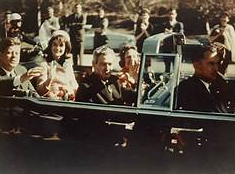From the Kennedy assassination to Trump, America is a land of conspiracies.
One way to resist the temptations of conspiracy theory is to hold on to the fact that accidents happen. Not everything is the result of a cunning plan. However, to some, the attempt to assassinate Donald Trump seemed like anything but an accident: it appeared too convenient that it occurred when President Joe Biden was already under pressure to step down. The timing of the attack left some wondering whether it was orchestrated to benefit Trump politically, allowing him to turn the incident into a symbol of defiance.
Others found it hard to believe that the attack was purely coincidental, particularly as it played into Trump’s narrative of being a victim and a fighter. This scenario turned the assassination attempt into an iconic moment, helping solidify his persona as a resilient leader despite the violence against him. Yet, such theories are self-contradictory—after all, it’s unlikely that both Biden and Trump would have been involved in the same plot. The absence of clear evidence supporting these claims only adds to the allure of such conspiracy theories.
What remains striking about the attack is how it placed mainstream Democrats in a difficult position, forcing them to respond to the political fallout. At the same time, it helped amplify the voices of hard-liners on both the left and the right, who have long thrived on divisive rhetoric and distrust in political institutions. This situation has further polarized American politics, with conspiracy theorists finding fertile ground for their narratives.
In the days following the shooting, one of the trending topics on UK Twitter/X was the term “staged.” A theorist with 35,000 followers posted a thread listing 14 reasons why the event appeared to be orchestrated. The reasons ranged from the supposedly questionable behavior of the Secret Service to the rapid coagulation of Trump’s blood, which some saw as inconsistent with a real-life assassination attempt. Others pointed to Trump’s ties to professional wrestling, where exaggerated drama is part of the entertainment, and speculated that this might explain the nature of the event.
On Talk TV, a security expert noted that the security lapse seemed “a little bit fishy,” further fueling suspicions about potential manipulation behind the scenes. While the expert was quick to clarify that he wasn’t a conspiracy theorist, his remarks highlighted how even reasonable people can be drawn into questions about the legitimacy of major political events. The mere suggestion of foul play has a way of lingering in the public’s mind, often without definitive evidence to back it up.
Such conspiracy theories bring to light the long-standing relationship between American politics and conspiratorial thinking. This dynamic has existed since the 1963 assassination of President John F. Kennedy, and it has continued to influence public perceptions of major political events. Over the decades, incidents like the Watergate scandal, 9/11, and now Trump’s assassination attempt have been shrouded in theories about hidden forces pulling the strings behind the scenes.
The attempt on Trump’s life only adds to this narrative, as the American public has long been captivated by the idea that major political events are often the result of hidden machinations. Whether these theories are grounded in fact or merely the result of political polarization, they continue to shape the national conversation. From the Kennedy assassination to today’s political landscape, America remains a land of conspiracies, where reality often seems as mysterious and opaque as the stories that fuel public imagination.

